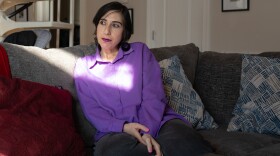Funding for the initiative was included in Mayor Craig Greenberg’s proposed 2024 budget, which Metro Council approved last week. The expansion of MetroWatch surveillance cameras is expected to cost $1 million, with another $500,000 set aside for purchasing and deploying new license plate readers, which take photos and log data about passing vehicles. Another $1 million is earmarked for lighting improvements in parks.
Greenberg first announced the investments at a recent press conference in Chickasaw Park, where two people were killed and four were injured in an April mass shooting. He said surveillance footage could have been useful in the aftermath as police struggled to get information from witnesses. No arrests have been made two months later.
“Had we had a camera in the right place, maybe we would have solved those [cases] and the individuals who were responsible for the murders that night could be held accountable,” Greenberg said.
Louisville officials say improved lighting and surveillance cameras can serve as a deterrent to crime.
More than 78 people have been murdered in Louisville so far this year and another 200 have been injured in shootings, according to the Louisville Metro Police Department. That’s about a 6% increase compared to this time last year.
LMPD Lt. Col. Steve Healey said the new funding for MetroWarch surveillance cameras are part of an increased focus on “intelligence-based policing.” He said video evidence of crimes can help law enforcement “make sure we’re prosecuting the right people.”
“I wish it was like NCIS where we can solve crimes in 30 minutes,” Healey said. “There’s a lot of times crimes happen and there may not be a witness, but there are cameras.”
The $1 million investment will add to the array of surveillance technology LMPD already employs, Healey said. That includes real-time surveillance cameras and license plate readers already installed in public spaces. Police also seek security camera footage from businesses and doorbell cameras.
In 2017, LMPD started using a relatively new technology called Shotspotter, a series of microphones that listen for gunshots and automatically alert police. The detection system was initially rolled out in police divisions covering Old Louisville and West End neighborhoods, which was criticized by activists who saw it as targeting mostly Black and working class residents.
LMPD’s use of Shotspotter was also criticized after the Kentucky Center for Investigative Reporting found alerts rarely lead to arrests.
Some activist groups like the Defund LMPD Spying Collective have pointed to research that undercuts the argument that surveillance cameras deter crime.
But Healey said he believes cameras are “valuable tools” for officers investigating crimes. There’s not a comprehensive plan yet for where new surveillance technology will be installed, but city officials say the focus will be on public parks and the downtown area.
“You’re going to look at crime analysis and where you’re having the majority of issues. You’re definitely going to want cameras there,” Healey said. “You’re definitely going to want cameras where people congregate a lot.”
Healey said $1 million set aside for lighting improvements in public parks will also deter crime.
“Criminals want to take the path of least resistance,” he said. “They may say ‘Oh man, it’s really lit up out here. Someone may see me,’ and move on.”
Following the mass shooting at Chickasaw Park, the city replaced 20 lights that were inoperable. New streetlights were also installed in 2021 at the bus stop where 16-year-old Tyree Smith was killed.
At the press conference earlier this month, Greenberg said many of Louisville’s lights in public spaces “don’t get changed unless someone notices the light bulb is out.”
Greenberg urged the public to report any non-functioning public lights to Metro311.
This story has been updated.







